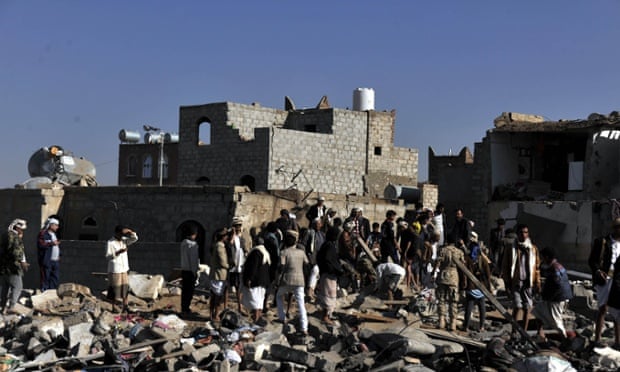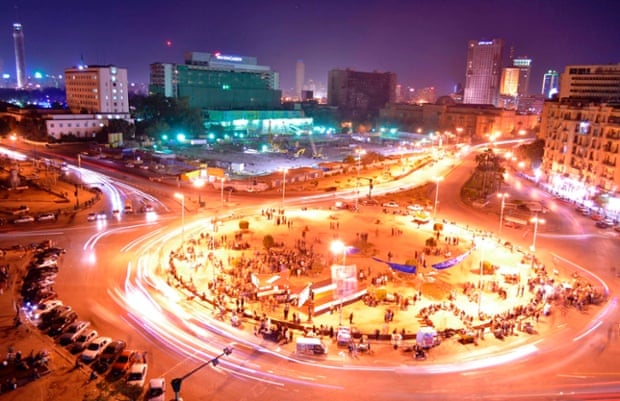HUMAN RIGHTS WATCH
(Beirut) – The Saudi Arabia-led coalition of Arab countries that conducted airstrikes in Yemen on March 26 and 27, 2015, killed at least 11 and possibly as many as 34 civilians during the first day of bombings in Sanaa, the capital, Human Rights Watch said today. The 11 dead included 2 children and 2 women. Saudi and other warplanes also carried out strikes on apparent targets in the cities of Saada, Hodaida, Taiz, and Aden.
The airstrikes targeted Ansar Allah, the armed wing of the Zaidi Shia group known as the Houthis, that has controlled much of northern Yemen since September 2014.
In January, the group effectively ousted the government of President Abdu Rabu Mansour Hadi. Human Rights Watch found that on March 26 warplanes struck populated urban neighborhoods in Sanaa and observed Ansar Allah forces who appeared to be firing anti-aircraft weapons from residential neighborhoods.
“Both the Saudi-led forces and the Houthis need to do everything they can to protect civilians from attack,” said Joe Stork, deputy Middle East and North Africa director. “Reports of air strikes and anti-aircraft weapons in heavily populated areas raise serious concerns that not enough is being done to ensure their safety.”
The governments of the United Arab Emirates, Kuwait, Bahrain, Qatar, Jordan, Morocco, and Sudan said that their warplanes also participated in airstrikes on March 26 and 27. Pakistan and Egypt provided naval support and the United States provided intelligence and logistical support, media reports said.
Interior Ministry officials linked to Ansar Allah shared with Human Rights Watch details of their final casualty count from the bombings in Sanaa on March 26.
They said that warplanes bombed various parts of the city, including Bani Hawat, a predominantly Houthi neighborhood near Sanaa’s international and military airports, and al-Nasr, near the presidential palace.
The officials said they had documented that 23 civilians had been killed and 24 wounded. Among the dead were 5 children, ages 2 to 13, 6 women, and an elderly man, they said. The wounded included 12 children, ages 3 to 8, and 2 women.
These numbers are consistent with information provided by two hospitals that Human Rights Watch visited. At the hospitals, Human Rights Watch documented the deaths of 11 civilians, including 2 women and 2 children, whose names were not included among those provided by Interior Ministry officials as well as 14 more wounded, including 3 children and 1 woman.
Amnesty International reported that bombing destroyed at least 14 homes in Bani Hawat.
Human Rights Watch has not been able to determine whether specific attacks complied with the laws of war, which apply to the armed conflict in Yemen. The laws of war prohibit attacks that target civilians or civilian property, or that do not or cannot discriminate between civilians and fighters.
Attacks that cause casualties or damage disproportionate to any anticipated military advantage are also prohibited. All parties to the conflict have an obligation to take all feasible precautions to spare civilians from harm, and not to deploy forces in densely populated areas.
Saudi Arabia’s past use of cluster bombs, which are indiscriminate weapons, raises concerns that they will be used in the current fighting, Human Rights Watch said. There is credible evidence that in November 2009 Saudi Arabia dropped cluster bombs in Yemen’s northern Saada governorate during fighting between the Houthis and the Yemeni and Saudi militaries.
Cluster munition remnants from the 2009 airstrikes, including unexploded submunitions, have been reported by a number of sources. In July 2013, Yemeni clearance personnel photographed unexploded US-made BLU-97 and BLU-61 submunitions. In May 2014, VICE News published photos and a video shot near Saada showing numerous remnants of US-made CBU-52 cluster bombs deployed in 2009.
Cluster munitions contain dozens or hundreds of submunitions. The submunitions are designed to explode when they hit the ground but spread over a wide area, often the size of a football field, putting anyone in the area at the time of attack at risk of death or injury. In addition, many submunitions do not explode on impact but remain armed, becoming de facto landmines.
The US provided Saudi Arabia with significant exports of cluster bombs between 1970 and 1999. Saudi Arabia possesses attack aircraft of US and Western/NATO origin capable of dropping US-made cluster bombs. Human Rights Watch has urged Saudi Arabia and Yemen to join the 2008 Convention on Cluster Munitions, which prohibits the use of cluster munitions in any circumstance.
“Saudi forces should publicly reject any use of cluster munitions and recognize that their use could have a devastating impact on civilians,” Stork said.
Saudis Should Not Repeat Use of Cluster Bombs
(Beirut) – The Saudi Arabia-led coalition of Arab countries that conducted airstrikes in Yemen on March 26 and 27, 2015, killed at least 11 and possibly as many as 34 civilians during the first day of bombings in Sanaa, the capital, Human Rights Watch said today. The 11 dead included 2 children and 2 women. Saudi and other warplanes also carried out strikes on apparent targets in the cities of Saada, Hodaida, Taiz, and Aden.
The airstrikes targeted Ansar Allah, the armed wing of the Zaidi Shia group known as the Houthis, that has controlled much of northern Yemen since September 2014.
In January, the group effectively ousted the government of President Abdu Rabu Mansour Hadi. Human Rights Watch found that on March 26 warplanes struck populated urban neighborhoods in Sanaa and observed Ansar Allah forces who appeared to be firing anti-aircraft weapons from residential neighborhoods.
“Both the Saudi-led forces and the Houthis need to do everything they can to protect civilians from attack,” said Joe Stork, deputy Middle East and North Africa director. “Reports of air strikes and anti-aircraft weapons in heavily populated areas raise serious concerns that not enough is being done to ensure their safety.”
The governments of the United Arab Emirates, Kuwait, Bahrain, Qatar, Jordan, Morocco, and Sudan said that their warplanes also participated in airstrikes on March 26 and 27. Pakistan and Egypt provided naval support and the United States provided intelligence and logistical support, media reports said.
Interior Ministry officials linked to Ansar Allah shared with Human Rights Watch details of their final casualty count from the bombings in Sanaa on March 26.
They said that warplanes bombed various parts of the city, including Bani Hawat, a predominantly Houthi neighborhood near Sanaa’s international and military airports, and al-Nasr, near the presidential palace.
The officials said they had documented that 23 civilians had been killed and 24 wounded. Among the dead were 5 children, ages 2 to 13, 6 women, and an elderly man, they said. The wounded included 12 children, ages 3 to 8, and 2 women.
These numbers are consistent with information provided by two hospitals that Human Rights Watch visited. At the hospitals, Human Rights Watch documented the deaths of 11 civilians, including 2 women and 2 children, whose names were not included among those provided by Interior Ministry officials as well as 14 more wounded, including 3 children and 1 woman.
Amnesty International reported that bombing destroyed at least 14 homes in Bani Hawat.
Human Rights Watch has not been able to determine whether specific attacks complied with the laws of war, which apply to the armed conflict in Yemen. The laws of war prohibit attacks that target civilians or civilian property, or that do not or cannot discriminate between civilians and fighters.
Attacks that cause casualties or damage disproportionate to any anticipated military advantage are also prohibited. All parties to the conflict have an obligation to take all feasible precautions to spare civilians from harm, and not to deploy forces in densely populated areas.
Saudi Arabia’s past use of cluster bombs, which are indiscriminate weapons, raises concerns that they will be used in the current fighting, Human Rights Watch said. There is credible evidence that in November 2009 Saudi Arabia dropped cluster bombs in Yemen’s northern Saada governorate during fighting between the Houthis and the Yemeni and Saudi militaries.
Cluster munition remnants from the 2009 airstrikes, including unexploded submunitions, have been reported by a number of sources. In July 2013, Yemeni clearance personnel photographed unexploded US-made BLU-97 and BLU-61 submunitions. In May 2014, VICE News published photos and a video shot near Saada showing numerous remnants of US-made CBU-52 cluster bombs deployed in 2009.
Cluster munitions contain dozens or hundreds of submunitions. The submunitions are designed to explode when they hit the ground but spread over a wide area, often the size of a football field, putting anyone in the area at the time of attack at risk of death or injury. In addition, many submunitions do not explode on impact but remain armed, becoming de facto landmines.
The US provided Saudi Arabia with significant exports of cluster bombs between 1970 and 1999. Saudi Arabia possesses attack aircraft of US and Western/NATO origin capable of dropping US-made cluster bombs. Human Rights Watch has urged Saudi Arabia and Yemen to join the 2008 Convention on Cluster Munitions, which prohibits the use of cluster munitions in any circumstance.
“Saudi forces should publicly reject any use of cluster munitions and recognize that their use could have a devastating impact on civilians,” Stork said.





























